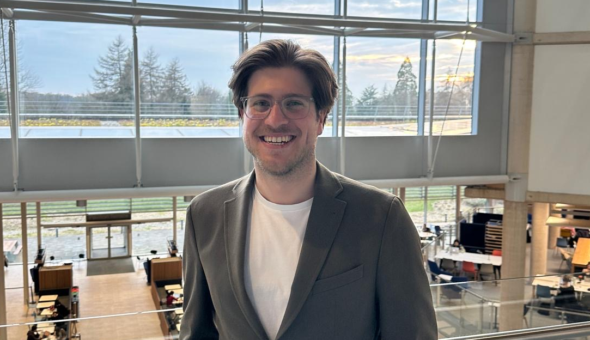November is PhD month on the Business and Society blog. We'll be featuring profiles of PhD student, as well taking as a closer look at some of their research work. Here we speak to Michael Rogerson about his work on modern slavery, his take on the problems with the Modern Slavery Act, and his ambitions for his research.
Can you tell us about your research?
My research topic is Modern Slavery. I started my PhD by looking at the Modern Slavery Act and Modern Slavery Statements but it’s slowly developed a technological focus. I’ve been looking at how new tech can be used to create visibility in supply chains, which really helped me realise the key theme that pulls all my work together. My research is summarised by accountability. Disclosure (via the statements) is a route to accountability and this technology is a route to make big organisations accountable for the suppliers that they choose.
Can you explain exactly what these statements are and what they’re meant to do?
All commercial organisations that have a certain level of turnover are legally requirement to publish an annual statement about the steps they’ve taken to prevent modern slavery within their business and supply chains. These statements should, in theory, lead to an organisational change piece where businesses investigate their supply chains and take steps to deal with any issues – this is really the underlying intention of the Modern Slavery Act.
However, what I found is that generally there has been no organisational change. Responsible organisations have done well on this because they were already doing well, and now they just get to publish a statement outlining that. But something like 75% of organisations haven't complied fully with the requirements, even five years down the line. And something like 15% of organisations haven't even published a statement at all on it! So, I started by exploring the underlying reasons why the Modern Slavery Act hasn't been taken seriously.
I published a paper earlier in the year looking at how universities have responded to the Act. Because universities have a public mission, you'd expect them to be doing more. And they do comply at a higher level than other organisations overall. However, they're limited by other legislation. And because they have to put cost and value first, that they are hamstrung in terms of the organisational change necessary.
So, with all these widespread problems or excuses, I wanted to look at the technological ways that organisations are shining light into the dark parts of supply chains. I published a paper earlier in the year on how blockchain can create visibility in supply chains, and I’ve got a paper under review at the moment with another PhD student at UWE. He has managed to work out a way that cocoa can be traced through supply chains using their DNA. It turns out that the DNA of a cocoa plant from a specific farm in Ecuador is sufficiently different to the DNA of cocoa picked even on the farm next door that you can track it from field to chocolate bar. So, given a sufficiently large database of cocoa farms, he would be able to pull a chocolate bar off a shelf in Sainsbury's, take it to a lab and tell you exactly where the cocoa came from. You could then find out whether social auditors have been there and what they said. Chocolate companies would no longer be able to make excuses about the high, persistent levels of modern slavery and child labour in their supply chains. They’d have nowhere to hide.
You seem to have quite a practical focus with your work. What would you say your ultimate goal is?
The aim eventually is to bring the tech piece and the modern slavery piece together to make it so easy for organisations to investigate their supply chains, that there’s no excuse for them not to comply with the Modern Slavery Act.
As universities and the public sector are very resource constrained, their procurement is all about best value. But if simple technology can allow them to get this level of visibility into their supply chains – instead of having to spend potentially tens of millions of pounds traveling around the world carrying out social audits - that could be huge. All of the UK universities and a lot of the public sector use the same procurement consortia - they will all buy through the same deals – so all it takes is for one organisation to shine some light on one supply chain. Then three hundred of the biggest procurers in the UK will have this data and be able to make an informed decision on whether there's a risk of modern slavery.
Of course, it’s not just about making it easy for companies. There are lots of hiding places for malpractice in supply chains – while some is unintentional, some is intentional, or at least negligent. This is why it’s so important that non-compliance with the Modern Slavery Act is handled. Because at the moment so many companies are knowingly doing things wrong and nothing happens. The independent review on Boohoo that came out was damning but they still don’t accept they did anything wrong, and now its share price is well on the way to recovering.
So, is this the issue, then? That the government aren’t enforcing it?
It’s hard not to conclude, given the small budget assigned to the issue, the fact that it’s taken as long as five years for a repository of statements to even be considered, and other policies likely to increase labour abuses, that fundamentally this barely registers as a government priority. MPs talk a good game on how the Modern Slavery Act is a world first. But someone pointed out to me recently that it may well have been a world first because we wanted to set the rules, and set the bar low. Because if someone else had set the standard we would have to match or build on that – like the Australians have now done with our Act. If we had left it to the EU, which next year is a is likely to introduce a human rights due diligence law, then then potentially that law would have been really strict and UK companies would have been within the scope of that.
The idea behind the law is to let everyone self-regulate, assuming that standards will increase because civil society, investors, customers and clients will all drive this as they will expect the expect the organisation to ‘do what’s right’. But that’s not how something like this works. It’s ridiculous to expect the consumer to drive something like this – are we all going to stop buying chocolate? If you buy chocolate there's an extremely high chance that there's modern slavery in in that product so what is your choice?
So, the only way things will improve is if there's someone beating non-compliance with a big stick. And at the moment that’s not happening. Around 2000 companies haven't published a statement at all in five years and the government doesn't even know who they are. The government apparently doesn't have a list of companies that have to comply - that's how little they care.
Why did you come to look at this topic?
My interest in the area – and Corporate Social Responsibility more broadly - began when I was quite young. After I left university, I went into industry for a few years and ended up working in Africa and the Middle East, for a big construction company. And everywhere I was seeing big risks that the company didn’t seem to be aware of. While I was out there, a lot of big stories broke about problems with modern slavery in Middle Eastern construction companies so at that point I was able to start really pushing the issue by saying “you don’t want to be on the front of this newspaper’. I took the lead on it, and started to look at it in more detail, reading industry reports etc. And then the company got caught up in a corruption scandal back in Brazil, and ended up closing all but a few of the offices in Africa and the Middle East overnight!
So, I came back to the UK and decided to do a MBA focused on sustainability. Then went to work for a management consultancy which was relatively immature in CSR terms. While I was there I did a post-grad certificate in sustainable value chains at Cambridge. I got to spend a year and a half researching Modern Slavery. The longer it went on, the more I found my evenings being spent reading more and more about modern slavery, and doing less and less and less for my actual job. So that’s where the interest really took hold.
Can you talk a bit about your methods?
So far, I’ve been interviewing people who are ‘on the front line’ of these issues. Either those who are preparing the statement, or people who potentially could be involved in educating others about what they should be doing. I’m also hoping to do some more quantitative analysis, using information from global databases, on for example why firms from certain countries comply more than firms from others and what national level factors might be involved in that. But ultimately I’m more interested in learning and why and how, and you can only really get that from talking to people.
That was hugely important with the blockchain paper in particular. I spoke to loads of people – people who were selling it, using it, writing about it, teaching about it. I found out a huge amount about how it works and what it does, and more importantly what the claims are of what it might be able to do versus in practice what it can actually do. And so few people have done this type of study into blockchain - lots of people are writing about it from an IT perspective but there’s very little written on what it’s actually doing in the real world. So, I now get approached regularly to review papers and speak on the topic. In the first half of the year my paper actually got picked up by news wires across the world, and I was one of the most read papers in Supply Chain Management.
You’re a member of CBOS. What do you like about being part of a research centre?
I’ve found CBOS a super friendly place. Especially in the early days, we would go for coffee all the time and just chat, so it made it really easy to ask for support or advice. The sustainability mission also means that everyone has this central shared interest – it does make a big difference having people around you who are all genuinely interested in each other’s work. I feel like a lot of PhDs don’t have that – you hear on twitter that some people are having a terrible time, because it can be so isolating, so this was really valuable. I think it can be difficult to have the confidence to put yourself out there, but I would counsel other PhDs to try and speak to others in the field, try and collaborate and work together, because otherwise it’s just you sat at your desk!
Particularly at the moment, when we aren’t getting the informal conversations while we wait for the kettle to boil, it’s important to find other ways to interact with others in the field!
Respond



